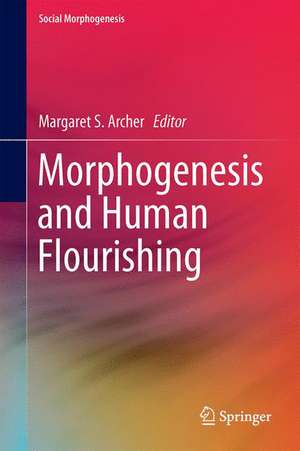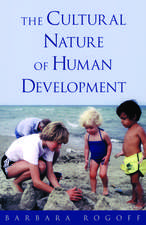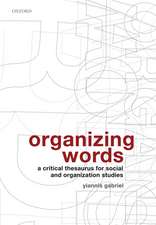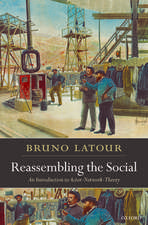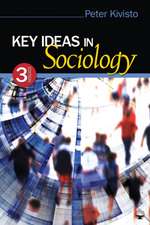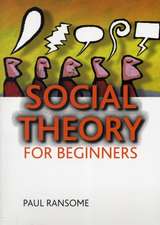Morphogenesis and Human Flourishing: Social Morphogenesis
Editat de Margaret S. Archeren Limba Engleză Hardback – 5 apr 2017
This book, the last volume in the Social Morphogenesis series, examines whether or not a Morphogenic society can foster new modes of human relations that could exercise a form of ‘relational steering’, protecting and promoting a nuanced version of the good life for all. It analyses the way in which the intensification of morphogenesis and the diminishing of morphostasis impact upon human flourishing. The book links intensified morphogenesis to promoting human flourishing based on the assumption that new opportunities open up novel experiences, skills, and modes of communication that appeal to talents previously lacking any outlet or recognition. It proposes that equality of opportunity would increase as ascribed characteristics diminished in importance, and it could be maintained as the notion of achievement continued to diversify. Digitalization has opened the cultural ‘archive’ for more to explore and, as it expands exponentially, so do new complementary compatibilities whose development foster yet further opportunities. If more people can do more of what they do best, these represent stepping stones towards the ‘good life’ for more of them.
| Toate formatele și edițiile | Preț | Express |
|---|---|---|
| Paperback (1) | 583.29 lei 38-44 zile | |
| Springer International Publishing – 20 iul 2018 | 583.29 lei 38-44 zile | |
| Hardback (1) | 707.46 lei 3-5 săpt. | |
| Springer International Publishing – 5 apr 2017 | 707.46 lei 3-5 săpt. |
Preț: 707.46 lei
Preț vechi: 832.30 lei
-15% Nou
Puncte Express: 1061
Preț estimativ în valută:
135.37€ • 141.70$ • 112.67£
135.37€ • 141.70$ • 112.67£
Carte disponibilă
Livrare economică 10-24 martie
Preluare comenzi: 021 569.72.76
Specificații
ISBN-13: 9783319494685
ISBN-10: 3319494686
Pagini: 420
Ilustrații: VIII, 296 p. 15 illus., 4 illus. in color.
Dimensiuni: 155 x 235 x 22 mm
Greutate: 0.71 kg
Ediția:1st ed. 2017
Editura: Springer International Publishing
Colecția Springer
Seria Social Morphogenesis
Locul publicării:Cham, Switzerland
ISBN-10: 3319494686
Pagini: 420
Ilustrații: VIII, 296 p. 15 illus., 4 illus. in color.
Dimensiuni: 155 x 235 x 22 mm
Greutate: 0.71 kg
Ediția:1st ed. 2017
Editura: Springer International Publishing
Colecția Springer
Seria Social Morphogenesis
Locul publicării:Cham, Switzerland
Cuprins
Chapter 1. Introduction; Margaret S. Archer.- Part I. What is Human Flourishing and On What It Depend?.- Chapter 2. Human Flourishing and Human Morphogenesis: A Critical RealistInterpretation and Critique.- Chapter 3. Some Reservations about Flourishing; Douglas V. Porpora.- Chapter 4. Reflexivity in a Just Morphogenic Society: A Sociological Contribution to Political Philosophy; Ismael Al-Amoudi.- Chapter 5. The Morphogenic Society as Source and Challenge for Human Fulfillment; Andrea M. Maccarini.- Part II. Does the Intensification of Morphogenesis Promote or Impede Eudaimonia?.- Chapter 6. Does Intensive Morphogenesis Foster Human Capacities or Liabilities?; Maragaret S. Archer.- Chapter 7. What Does a 'Good Life' Mean in a Morphogenic Society? The Viewpoint of Relational Sociology; Pierpaolo Donati.- Chapter 8. Flourishing or Fragmenting Amidst Variety: And the Digitalization of the Archive; Mark Carrigan.- Chapter 9. Corporations, Taxationsand Responsibility: Practical and Onto-Analytical Issues for Morphogenesis and Eudaimonia: A Posse ad Esse?; Jaime Morgan and William Sun.- Part III. Social Institutions and the Good Life.- Chapter 10. Networks and Commons: Bureaucracy, Collegiality and Organizational Morphogenesis in the Struggles to Shape New Sharing Institutions; Emmanuel Lazega.- Chapter 11. Eudaimonic Bubbles, Social Change and the NHS; Tony Lawson.- Chapter 12. The Will to Be: Human Flourishing and the Good International Society; Colin Wright.- Chapter 13. Creating Common Good: The Global Sustainable Information Society as the Good Society; Wolfgang Hofkirchner.
Notă biografică
Margaret Archer heads the project at EPFL 'From Modernity to Morphogenesis'. She was elected as the first woman President of the International Sociological Association at the 12th World Congress of Sociology. She is a founder member of both the Pontifical Academy of Social Sciences and the Academy of Learned Societies in the Social Sciences and is a trustee of the Centre for Critical Realism. She studied at the University of London, graduating B.Sc. in 1964 and Ph.D. in 1967 with a thesis on The Educational Aspirations of English Working Class Parents. She was a lecturer at the University of Reading from 1966 to 1973. She is one of the most influential theorists in the critical realist tradition. At the 12th World Congress of Sociology, she was elected as the first woman President of the International Sociological Association, is a founder member of both the Pontifical Academy of Social Sciences and the Academy of Learned Societies in the Social Sciences. She is a Trustee of the Centrefor Critical Realism.
Textul de pe ultima copertă
This book, the last volume in the Social Morphogenesis series, examines whether or not a Morphogenic society can foster new modes of human relations that could exercise a form of ‘relational steering’, protecting and promoting a nuanced version of the good life for all. It analyses the way in which the intensification of morphogenesis and the diminishing of morphostasis impact upon human flourishing. The book links intensified morphogenesis to promoting human flourishing based on the assumption that new opportunities open up novel experiences, skills, and modes of communication that appeal to talents previously lacking any outlet or recognition. It proposes that equality of opportunity would increase as ascribed characteristics diminished in importance, and it could be maintained as the notion of achievement continued to diversify. Digitalization has opened the cultural ‘archive’ for more to explore and, as it expands exponentially, so do new complementary compatibilities whose development foster yet further opportunities. If more people can do more of what they do best, these represent stepping stones towards the ‘good life’ for more of them.
Caracteristici
Analyses how the intensification of morphogenesis and diminishing of morphostasis impacts upon human flourishing Defines the conditions for a Morphogenetic society to promote the good life for all Examines the micro, meso and macro aspects of human flourishing
